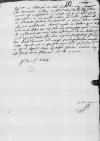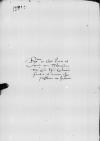Letter #2073
Ioannes DANTISCUS to Tiedemann GIESEHeilsberg (Lidzbark Warmiński), 1539-02-17
English register:
Dantiscus thinks there has been no reply from the Thorn (Toruń) Town Council because they have reached an agreement with their adversaries [the Gdańsk (Danzig) Town Council] but do not want this fact to surface.
As for the tax, he intends to proceed like Giese. Others may do as they think fit.
Dantiscus is pained that none of his countrymen (nemo de nostris) stood up for him at the court [on the matter of where to deposit the tax money].
Dantiscus has not yet had news of a Turkish defeat.
Manuscript sources:
Prints:
| ||||||||
Text & apparatus & commentaryPlain textText & commentaryText & apparatus
Reverendissimo in Christo Patri et Domino, domino
Reverendissime in Christo Pater et Domine, frater et amice carissime et honoran(de) or honoran(dissime)⌈honoran(de)honoran(de) or honoran(dissime)⌉.
Salutem et fraternam commendationem.
Quod
Idipsum ... illegible⌈...... illegible⌉ cum contributo facturus sum, sicut Dominatio Vestra Reverendissima statuit. Agant alii suo arbitratu. Hoc tamen male me habet, quod in aula nostra credi debet, ex me solo omnia processisse, cum nemo de nostris vel per unum iota testimonium de me dederit. Sed haec, quemadmodum alia eiusmodi, cf. Adagia 283 Susque deque ⌊susque deque feram etc.cf. Adagia 283 Susque deque ⌋
De clade Turcica nihil accepi, paulo post forsan accepturus.[2] Apud me in praesens novi nihil est scientia Dominationis Vestrae Reverendissimae dignum.
Quae diutissime feliciter valeat.
Ex
Reverendissimae Dominationis Vestrae frater deditissimus
[1] In his earlier cf.
[2] This possibly refers to recapturing the


 BCz, 245, p. 130
BCz, 245, p. 130